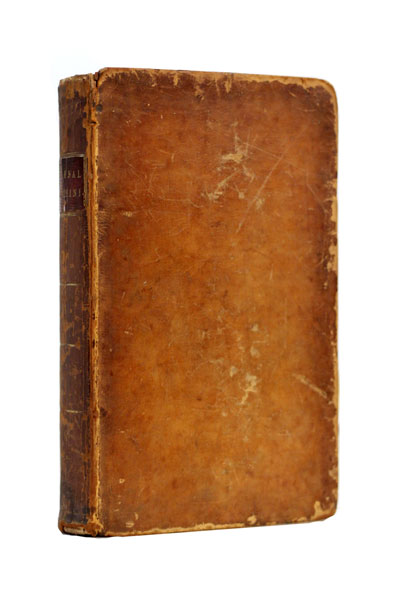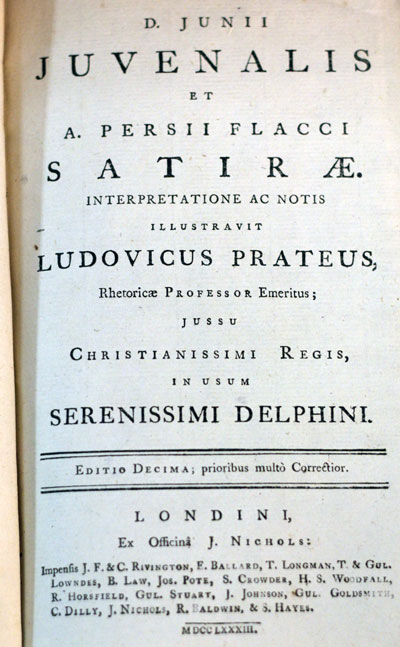All text is in the original Latin. Some of the most wonderful satires of Roman society, still very relevant to the modern era.
About Juvenal (from All-history.org):
The most powerful of all Roman satiric poets. Many of his phrases and epigrams have entered common parlance—for example, “bread and circuses” and “who will guard the guards themselves?”
The one contemporary who ever mentions Juvenal is Martial, who claims to be his friend, calls him eloquent, and describes him as living the life of a poor dependent cadging from rich men. There are a few biographies of him, apparently composed long after his death; these may contain some nuggets of fact, but they are brief, ill-proportioned, and sometimes incredible.
From these sparse sources it can be inferred that Juvenal’s family was well-to-do, and he became an officer in the army as a first step to a career in the administrative service of the emperor Domitian (ad 81–96) but failed to obtain promotion and grew embittered. He wrote a satire declaring that court favourites had undue influence in the promotion of officers, and for this he was banished—possibly to the remote frontier town of Syene, now Aswān, in Egypt—and his property was confiscated. In 96, after Domitian’s assassination, Juvenal returned to Rome; but, without money or a career, he was reduced to living as a “client” on the grudging charity of the rich. After some years his situation improved, for autobiographical remarks in Satire 11 show him, now elderly, living in modest comfort in Rome and possessing a farm at Tibur (now Tivoli) with servants and livestock. Still pessimistic, the later Satires show a marked change of tone and some touches of human kindness, as though he had found some consolation at last. Though no details of his death exist, he probably died in or after 127.
The Satires
Juvenal’s 16 satiric poems deal mainly with life in Rome under the much-dreaded emperor Domitian and his more humane successors Nerva (96–98), Trajan (98–117), and Hadrian (117–138). They were published at intervals in five separate books. Book One, containing Satires 1–5, views in retrospect the horrors of Domitian’s tyrannical reign and was issued between 100 and 110. (The historian Tacitus, a contemporary of Juvenal, was also embittered by the suspicion and fear of that epoch.) Book Two, the single, enormous Satire 6, contains topical references to the year 115. The third Book, with Satires 7, 8, and 9, opens with praise of an emperor—surely Hadrian, who endowed a literary institute to assist deserving authors—whose generosity makes him the sole hope of literature. There is no datable allusion in Book Four, which comprises Satires 10–12. Book Five, made up of Satires 13, 14, 15, and 16, has two clear references to the year 127.
The Satires attack two main themes: the corruption of society in the city of Rome and the follies and brutalities of mankind. In the first Satire, Juvenal declares that vice, crime, and the misuse of wealth have reached such a peak that it is impossible not to write satire, but that, since it is dangerous to attack powerful men in their lifetime, he will take his examples from the dead. He does not maintain this principle, for sometimes he mentions living contemporaries; but it provides a useful insurance policy against retaliation, and it implies that Rome has been evil for many generations. Male homosexuals are derided in two poems: passives in Satire 2, actives and passives together in Satire 9. In the third Satire a friend of Juvenal explains why, abandoning the humiliating life of a dependent, he is determined to live in a quiet country town and leave crowded and uncomfortable Rome, which has been ruined by Greeks and other foreign immigrants; while in the fifth Juvenal mocks another such dependent by describing the calculated insults he must endure on the rare occasions when his patron invites him to dinner. The fourth relates how Domitian summoned his cringing Cabinet to consider an absurdly petty problem: how to cook a turbot too large for any ordinary pan.
Satire 6, more than 600 lines long, is a ruthless denunciation of the folly, arrogance, cruelty, and sexual depravity of Roman women. The seventh Satire depicts the poverty and wretchedness of the Roman intellectuals who cannot find decent rewards for their labours. In the eighth, Juvenal attacks the cult of hereditary nobility. One of his grandest poems is the 10th, which examines the ambitions of mankind—wealth, power, glory, long life, and personal beauty—and shows that they all lead to disappointment or danger: what mankind should pray for is “a sound mind in a sound body, and a brave heart.” In Satire 11, Juvenal invites an old friend to dine quietly but comfortably and discourses on the foolishly extravagant banquets of the rich. The 12th is a quiet little poem distinguishing between true and mercenary friendship. In the 13th Juvenal offers sarcastic consolation to a man who has been defrauded of some money by a friend, telling him that such misdeeds are commonplace; while in the 14th he denounces parents who teach their children avarice. Satire 15 tells of a riot in Egypt during which a man was torn to pieces and eaten: a proof that men are crueler than animals. In the 16th Juvenal announces that he will survey the privileges of professional soldiers, an important theme; but the poem breaks off at line 60 in the middle of a sentence: the rest was lost in ancient times.
Technically, Juvenal’s poetry is very fine. The structure of the individual Satires is—with a few exceptions—clear and forceful. They are full of skillfully expressive effects in which the sound and rhythm mimic and enhance the sense; and they abound in trenchant phrases and memorable epigrams, many known to people who have never heard of Juvenal: “bread and circuses”; “slow rises worth, by poverty oppressed”; “who will guard the guards themselves?”; “the itch for writing”; “the greatest reverence is due to a child.” Vivid, often cruelly frank, remarks appear on almost every page: after describing a rich woman’s efforts to preserve her complexion with ointments, tonics, donkey’s milk, and poultices, Juvenal asks, “Is that a face, or an ulcer?” He describes striking and disgusting scenes with a clarity that makes them unforgettable: we see the statues of the emperor’s discarded favourite melted down to make kitchenware and chamber pots; the husband closing his disgusted eyes while his drunken wife vomits on the marble floor; the emperor Claudius (poisoned by his consort) “going to heaven” with his head trembling and his lips drooling long trains of saliva; the impotent bridegroom whimpering while a paid substitute consoles his wife. Juvenal is not a poet to be relished by soft hearts or optimists, but he has power.
His work was forgotten for a time after his death. Later it began to be read and quoted, first by the Christian propagandist Tertullian—who lived and wrote about ad 200 and was as full of passionate indignation as Juvenal—then by other Christian authors and also by pagan students of literature. A commentary on the Satires (which survives) was compiled at some time between 350 and 420, and two editions of the text were produced, based on one master copy: apparently the only copy that had been preserved until then. Thenceforward Juvenal has never ceased to be studied and admired, and he has been imitated by many satirists; for instance, by Giovanni Boccaccio, Nicolas Boileau, and Lord Byron. The term “Juvenalian satire” still denotes any criticism of contemporary persons and institutions in Juvenal’s manner.



